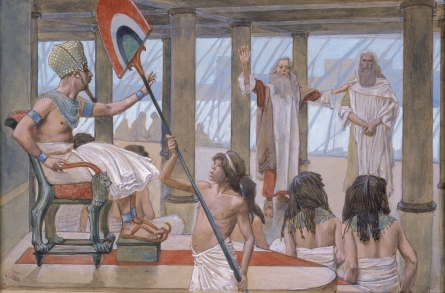Written by Daniel Levine, third-year cognitive science major and gabbai of UCLA’s Jewish Learning Initiative on Campus
Throughout the Exodus story, we are presented with multiple interactions between Moses and Pharaoh. On their surface, these meetings seem to comprise Moses asking Pharaoh for permission to allow the Jews to go to the desert in order to worship G-d and Pharoah reacting by either immediately saying no, or saying yes and then retracting his decision later on. However, by looking more closely at one of these interactions we can see an interesting cultural conflict between Moses and Pharoah — one that may be able to represent Judaism as a whole.
The interaction (Exodus 7:9,11) goes as follows:
Moses said: “With our youth and with our elders we will go, with our sons and with our daughters, with our flocks and with our cattle we will go, for it is a festival of the Lord to us.”
Pharoah replied: “Not so! let the men go now and worship the Lord, for that is what you request.” And he chased them out…
At first glance this seems like yet another ordinary interaction between Moses and Pharaoh. Moses wanted the entire nation to leave and worship G-d while Pharaoh wanted to limit the amount of people to leave. But if we look at this story a bit deeper, it teaches us an amazing truth about Judaism.
It seems that Pharaoh was somewhat surprised by Moses’ request. Based on his own, ancient Egyptian religious practices, he probably wondered, “Why would you need to bring all the women and children? Everyone knows that formal religion and religious rituals are only practiced by a few select individuals at the top of society!” Moses, however, disagreed with this perception and was not pacified until the entire nation was given permission to leave.
Essentially, what he was telling Pharaoh was, “Maybe in your society and religion only a few select people are in charge of the rituals and the service, but in our religion, everyone has an equal portion in the service of G-d.”
There is an important concept in Judaism called “Kol Yisrael areivim zeh la’zeh” — “All Jews are guarantors for one another.” A guarantor is basically a person who cosigns someone else’s loan, taking on the responsibility in case of a default. For instance, if my friend wants to take out a huge loan and the bank wants to make sure that the loan will be repaid, the bank will require my friend to gather a few other people to be held responsible in case he refuses or is unwilling to pay. These few people are known as the guarantors. The Talmud relates that based on this concept, if one Jew has not fulfilled his or her obligation in a certain mitzvah, then the obligation falls upon every other Jew in the world. This is so vastly different from the religious hierarchy which filled ancient world religions, where every ritual was done by the top few people of that society, with the masses left sitting in ignorance. Moses was teaching the lesson that the ideal in Judaism is for every single person (young or old, woman or man) to participate, and that the service of a 14-year-old boy or a 24-year-old woman to G-d is just as important as that of Moses himself.
The concept of “Kol Yisrael areivim zeh la’zeh” in this week’s Torah portion is especially timely in light of the heartbreaking terrorist attacks of the last few weeks. We see that Judaism is much more than a culture or religion — it truly forms a nation of brothers and sisters. May we come together and pray that those injured will have a speedily recovery and those who are mourning be comforted, as traditionally said in a house of mourning, “among the other mourners of Zion and Jerusalem.”
_________
This article is part of Ha’Am’s Friday Taste of Torah column. Each week, a different UCLA community member will contribute some words of Jewish wisdom in preparation for Shabbat.

